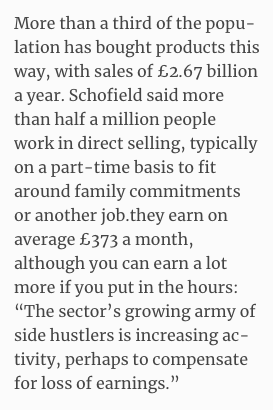What does the DSA, the ‘regulatory body’ for MLMs in the UK, actually DO?
The UK’s Direct Selling Association (DSA) have been on a noticeable PR drive over the past year. But what does the MLM industry organisation do? And do they actually do any good?
Several years ago I was contacted by the PR representative of the DSA. They’d seen our articles on the industry and wanted to give more context. Over an exchange of emails, I was asked to meet their then Director General of the DSA as she has “worked in the sector for many years so has a very in-depth knowledge of the industry”.
At that time I naively though the DSA was genuinely some kind of regulatory body that cared about ethics, so agreed to meet Rachel, their PR representative and the Director General.
Over lunch, I was asked what problems I had with the industry, and both seemed genuinely interested. So I explained at length the many issues I had uncovered, not least the many unethical lies representatives of member companies used to recruit and sell.
I was surprised that the Director General, someone who was apparently so knowledgable about the industry, knew so little of what was happening. It seemed inconceivable to me, but I gave her the benefit of the doubt as she seemed genuine. At the end of the meeting she asked me to send evidence of specific claims and said she’d follow up on them.
After the meeting Rachel, the DSA’s PR representative emailed me to let me know that there were quite a few other broader points that they had taken away from the meeting that they hoped to move forward with the DSA Board.
‘We want to improve transparency’
In 2018, Rachel got in touch again to say that there was a “genuine appetite” at the DSA to “improve transparency” and asked what I felt would make a difference.
This is what I sent back about the problems with the industry and some proposed solutions:
- No income disclosure statements. I’d like to see all MLM companies publish annual statements clearly stating how many reps they have, what % are active, and what each level are earning in profit. These must honestly and clearly show the earning potential of the business.
- No information for new recruits. I’d like it to be mandatory that new recruits see income disclosures before they join for a realistic picture of the business.
- No expense indications. Again I would like companies to be transparent about expenses, and give new recruits a realistic idea of how much they’ll need to spend (for example personal purchases). This would not be difficult to ascertain.
- No clamping down on untrue claims by reps. These include irresponsible health claims, and wild income claims (I’m about to publish a Nu Skin article proving that a rep’s video boasts about hers and her teams income are lies – and this video has been widely available since 2016!).
- Not encouraging proper bookkeeping or legal tax practices. Reps are not encouraged to keep proper books (which would show them how much or little they were making in actual profit, not sales). They’re also misled on what they can claim expenses on. An accountant told me that her MLM rep clients often try to claim expenses for nails and hair, for example, telling her they have special DSA dispensation to do so. When she challenges them for proof, their company recommends they find a more ‘willing’ accountant (i.e. one who will overlook the rules).
That was more than two years ago, and yet to date we’ve heard nothing more on this, and certainly seen no evidence that any of these recommendations have been implemented.
And that doesn’t surprise us. Because if new recruits are told the financial truth of what they’re buying into, we don’t believe they’d join. And once in, if they could see in black and white how much money they were losing (according to research published by the FTC, an average of 99.6% will lose money once business expenses are taken into account), then they’d soon leave.
What is the DSA? And what do the DSA do?
So what exactly is the DSA UK, and why should they care what MLM companies get up to? According to the DSA:
“The Direct Selling Association UK (DSA UK) was founded in 1965 to represent the interest of the business engaged in the Direct Sales of Consumer goods. It is an incorporated association with more than 50 members, who engage with at least half a million people in the UK in the distribution of their products. It is first and foremost an association controlled by its Members.
“The DSA UK is run by a democratically appointed Board. The Board Members are representatives of a cross section of Direct Selling organisations who are responsible for the Associations governance.”
Their mission is:
“To see Direct Selling universally recognised and respected as one of the finest methods of marketing to Consumers.”
And their vision is:
“To protect, serve and promote the effectiveness of member companies and the independent Direct Sellers marketing their products, to ensure the highest level of business ethics and service to Consumers.”
To be fair to the DSA, they don’t claim in their mission to care about or want to protect the general public. They are clear that their agenda is to further the interests of their member companies.
They do however say their mission is to, “ensure the highest level of business ethics and service to Consumers.” And it is this point we hold them accountable to in this article. So, based on this stated mission, does the DSA do what it says it aims to do? Or is the DSA, as far as industry regulation and ethics are concerned, pointless?
Which MLM companies are a member of the UK DSA?
The following MLM companies are just some of the members of the UK DSA:
- Herbalife
- Arbonne
- Younique
- MONAT
- Nu Skin
- doTERRA
- Amway
- Usborne Books
- It Works
- Forever Living Products
- Juice Plus
- Avon
‘99.6% of people on average will lose money in an MLM’
The DSA protects the interests of their members who are multi-level marketing companies (MLMs). Sometimes the companies will try to label themselves ‘direct selling’, ‘network marketing’ or ‘social selling’. But if a company has a recruitment element (i.e. members can build teams) then it’s an MLM.
From our extensive research, we believe that MLM reps prey on the financially vulnerable and sell them a seemingly achievable, but false dream.
In his in-depth research published by the Federal Trade Commission (FTC), Dr Jon M Taylor, MBA, Ph.D from the Consumer Awareness Institute calculates that an average of 99.6% of people will lose money after deducting business expenses.
This is even worse than the illegal pyramid schemes so many MLM reps (and the current Director General of the DSA) are keen to distance themselves from. According to Dr Taylor:
“…the loss rates for MLM participants (averaging at least 99.6% as shown in Appendix 7A) is far greater than for participants in classic pyramid schemes, which is approximately 90%.”
So it seems you’d be better off joining an illegal pyramid scheme than an MLM. Dr Taylor concludes by describing MLMs as “a mathematical trick played on the unwary”.
We believe that the DSA knows that MLMs don’t work
And yet, despite this MLMs are still with us. And in the past year, in which people have lost incomes due to lockdowns, they’ve thrived. So why is that?
MLMs succeed because, in our opinion, everyone involved is telling lies – from the companies who fete the top reps who appear to make money (even if they’re secretly bankrupt), to the reps at the bottom who lie to try to recruit people into the business to try to stem their losses.
We believe that the few people at the top of the pyramid (usually less than 0.4% of all recruits) know the business doesn’t work. They see the churn rate of disappointed reps (shamed to believe the failure was theirs because they ‘didn’t want it enough’ or ‘didn’t try hard enough’) and simply recycle the same false dream to the next round of desperate hopefuls.
Over the years we’ve seen reps at the top of various MLMs recruit desperate people, and watched those people quietly slip away, only to be replaced with a fresh batch of desperate people.
Quite frankly, it’s shameful and disgusting to see those successful reps lavish each fresh batch of hopefuls with the same false love and hope.
The high up, seasoned reps must know they’re highly unlikely to achieve the success they are luring them in with. But it seems they don’t care as long as their downlines grow to boost their own bonuses, and they get a cut of their poor new recruits’ purchases and sales.
And even more shameful – many of those reps aren’t even truly living the lifestyles they show off in order to recruit those desperate reps. As we revealed here, many ‘successes’ are funding their lavish lifestyles with eye-watering loans, and others are hiding bankruptcy and insolvency. Some even pretend that lifestyles paid for by wealthy parents or partners are earned from their MLM.
The reps must know the ‘opportunity’ they sell doesn’t work for the vast majority of people. The companies themselves must know it doesn’t work (they see the churn rate, and they know exactly how much – or little – they pay out to them). And therefore the DSA, made up of these MLM companies, must know the opportunity doesn’t work.
What respectable trade body would knowingly encourage people to join an ‘opportunity’ that will end up with a possible 99.6% of them losing money?
Why we believe the current Director General of the DSA tells lies
Last year, during the first lockdown I appeared on BBC Radio 4’s Women’s Hour with Susannah Schofield, their new Director General, and was very disappointed to hear her trot out age-old misconceptions about the industry. Misconceptions like:
- “It’s a great opportunity for women to earn”
- “A pyramid scheme is where you take money and give nothing back”
- ‘Every organisation is pyramid shaped’
- “You don’t make money from recruiting”
She also hilariously claimed that during the lockdown:
“As an association we took a very serious remit to say there was to be no active recruitment; this was not a time to go out and prey on people’s vulnerability, as they were being furloughed.”
Really? Then why the the DSA pay for an advertorial in the Sunday Express during lockdown (in which Susannah herself is quoted in) that said:
“As millions take a financial hit from the coronavirus lockdown, many are hunting for ways to make up the income they have lost in recent weeks…
“Direct Selling could help you raise extra money, while staying healthy and complying with social distancing rules by working online from home.”
So clearly, for the DSA lockdown IS a time to “prey on people’s vulnerability”. No wonder the reps display such appallingly unethical behaviour. (Funnily enough, since we exposed this hypocrisy the DSA has removed this press piece from their website!)
And that wasn’t a one-off mistake. Heres another link that the DSA hasn’t removed yet, am article that appeared in the Sunday Express on 19 April 2020, entitled Busy on the home front with new ways to earn. In it, Susannah says:

She’s also quoted in this Retail Gazette article dated 1 June 2020:
“Obviously, these are worrying, and unprecedented times, but the social shopping model is well-equipped to survive through this sort of crisis… This is partly because the sales base is spread throughout the UK across a network of many thousands of individual salespeople.”
And here she is again, in lockdown three:

And again:
“Salespeople are signing up in part because they need extra money after losing jobs or cutting down on their hours, says Susannah Schofield, director general of the DSA.”
In fact, rather than deciding that the pandemic was “not a time to go out and prey on people’s vulnerability, as they were being furloughed,” it appears that Susannah Schofield has been on a year-long PR spree for the MLM industry, as these are just a few of many press quotes from her.
Susannah Schofield pretended to want to engage with me
During the Women’s Hour segment Susannah said on air that she’d like to speak to me about my concerns. And after the show the producer emailed me to say:
“Rachel and Susannah have been in touch asking if I could introduce you to them. Are you happy for me to send them your email address?”
I found this very odd. Because not only have Rachel and I exchanged many emails over the past few years, but I’ve actually had lunch with her! And not only that – it was me that connected Rachel with Women’s Hour in the first place.
I believe that Susannah’s claims that she wanted to contact me was just a ruse to pretend to the BBC and their listeners that the DSA is keen to be ethical and engage with critics of the industry.
Unsurprisingly Susannah has never made an effort to contact me, despite me giving the BBC permission to give her my email address. But given that they removed the press piece I criticised from their website, they must still be reading our articles about them!
I can only conclude from above that Susannah was lying. Why say on air that you discouraged recruitment during lockdown when you yourself were promoting it? And why remove the evidence if you were not lying?
And why pretend to the BBC that you wanted to contact me but didn’t have my details, when you had my details and had no intention of contacting me!
The DSA don’t seem to care about unethical income and heath claims
Since Women’s Hour, little has changed; the DSA still don’t appear to care much about upholding their own Code of Conduct. In a recent interview with BBC1’s Morning Live show, which aired on 27 January 2021, Susannah Schofield said:
“If you’re a DSA regulated member part of the Code of Conduct says that you cannot talk about alleged earnings, you can only talk about what you earned.”
This echoes a statement she made on Women’s Hour:
“Consultants can only talk about their own ability… it has to be first person for what they’ve earned and they can talk about that.”
And the DSA Code of Business Conduct agrees:
“Any earnings claims must relate to actual earnings from the opportunity by an identifiable person and be capable of verification.”
Unfortunately, DSA regulated member company reps don’t abide by this Code of Conduct – even ones at the top of the companies. Here’s an Instagram story from a rep who isn’t just high up at a DSA member company but actually appears to be an employee:

And here’s another income claim on a Facebook post from one of the top reps of a DSA member company, one who often appears in their recruitment videos:

The DSA know about these claims. I even told Susannah about them live on air on Women’s Hour. And people have contacted me to tell me that they have reported health and income claims that contravene their Code of Conduct to the DSA.
And yet nothing is done. If you complain you’re apparently simply told that the DSA “has spoken” to the company involved to let them know. But still the non-compliant health and income claims come thick and fast.
If you follow up on your complaint, or ask how the complaint process works, the DSA actually questions YOUR motives for reporting blatant and misleading health and cinema claims, and suggests you may simply be a competitor! What genuine industry watchdog would do this?
So clearly, as a ‘regulatory body’ the DSA appears to be useless. But if Susannah herself apparently doesn’t care, then why should the companies who profit from these irresponsible and unethical claims?
MLM is NOT an “effort based business
There’s one more very irresponsible misrepresentation that Susannah makes that we need to correct. On Morning Live she tells the BBC: “…it is an effort based business; you do have to work at earning the money.”
This is such a dangerous lie that we know is often told to people signed up to MLMs; a lie that often keeps them losing more money. Because the truth, as we know, is that as many as 99.6% of people who join an MLM won’t make money. And many of those people work VERY hard.
People like this woman who says she tried her best and worked more than full time hours for MLM It Works and STILL made a loss of £3,239.87. As she says:
“I estimate that, on average, I worked 12 hours a day, seven days a week trying to make a success of It Works. And I have a marketing degree, so I’m not stupid. But it’s just not possible to earn money with them in my opinion.”
Telling people that success in MLMs is “effort based” is dangerous for two reasons in our opinion.
Firstly it gives people hope that if they just work harder they’ll make money. So they throw more money and time at the MLM they’re signed up to. But for many it doesn’t matter how many hours they work – the statistics show that they won’t make money.
The second reason why this is such a dangerous and irresponsible thing to say is that it shames everyone who fails. They may have worked every available moment and followed all the advice of their upline but, like the woman we interviewed, it was impossible to make it work.
Being told they failed because they didn’t put in enough effort is emotionally damaging and a lie, and it’s a shame to hear the Director General of the DSA perpetuate this misconception.
In fact, if you REALLY want to get to the top of an MLM, this is what you allegedly have to do.
What’s the point of the DSA?
So that leads us back to the question we started with: What do the DSA do? And is there any point to them, beyond self-interest?
If the purpose of the DSA is to act as a PR and marketing machine for their member companies, then it is fulfilling its role. But if they are supposed to in any way promote or uphold standards, then in our opinion they’re not just failing. They’re pointless.
If anything, in our opinion, by attempting to give the MLM industry a legitimate veneer, they are actually doing more damage. Thanks to their misrepresentations in the media, we believe they are just helping to lure more financially vulnerable people into an industry with a reputed 99.6% failure rate.
It’s a good thing then that, despite the brief lockdown blip, it looks like the MLM industry is dying out.
Read more about MLMs
If you’d like to learn more about the MLM industry, here are a few articles to read:
- The 10 ugly truths MLMs don’t want you to know
- Is it REALLY possible to make money in an MLM? We do the sums
- Are MLMs really pyramid schemes? Why you can’t make money selling their products
- Seven lies an MLM rep will tell you – and the REAL truth you need to know
You can also read some of our investigations into MLM companies here:
- Is MLM Amway a scam? And how much can you earn with them?
- How much money can you really make working for Arbonne?
- How much can you earn with MLM Nu Skin
- How much money can you earn with Isagenix?
- How much can you earn as an It Works distributor?
And here:
- How much can you earn with Younique?
- How much money can you earn with MONAT?
- How much money can you make with doTERRA?
- The complete lowdown on MLM Juice Plus+
- How much money can you earn with MLM Usborne Books at Home?
Photo by Chris Karidis




